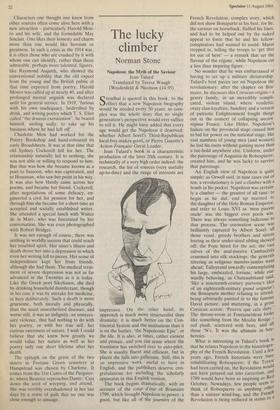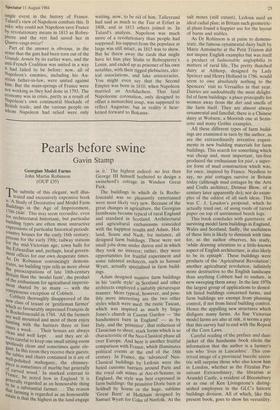The lucky climber
Norman Stone
Napoleon: the Myth of the Saviour Jean Tulard Translated by Teresa Waugh (Weidenfeld & Nicolson £14.95)
Stendhal is quoted in this book, to the effect that a new Napoleon biography would be needed every 50 years: so com- plex was the whole story that no single generation's perspective would ever suffice to tell it. He might have added that every age would get the Napoleon it deserved: whether Albert Sorel's Third-Republican local-boy-makes-good, or Pierre Gaxotte's Action-Francaise Great Leader.
Jean Tulard's book is a characteristic production of the later 20th century. It is technically of a very high order indeed: the research, the list of sources (very usefully up-to-date) and the range of interests are impressive. On the other hand, its approach is much more structuralist than dramatic: it is much better on the Con- tinental System and the institutions than it is on the battles, 'the Napoleonic Epic', or the life. It is also, at times, rather earnest and prosaic, and you can sense where the translator has switched over to auto-pilot. She is usually fluent and efficient, but in places she falls into gallicisms. Still, this is an impressive work. useful to have in English, and the publishers deserve con- gratulations for including the scholarly apparatus in this English version.
The book begins dramatically, with an account of the coup d'etat of Brumaire 1799, which brought Napoleon to power: a good, but like all of the journees of the
French Revolution, complex story, which did not show Bonaparte at his best, for he, the saviour on horseback, fluffed his lines, and had to be helped out by the naked appeal to force that he and his fellow- conspirators had wanted to avoid. Murat stepped in, telling the troops to 'get that lot out of here' — a remark that set the flavour of the regime, while Napoleon cut a less than inspiring figure.
No wonder that he was embarrassed at having to set up a military dictatorship. Tulard's best pieces are on Napoleon the revolutionary: after the chapter on Bru- maire, he discusses this Corsican origins - a gentry family, in an incredibly compli- cated, violent island, where vendetta, crazy clan-loyalties, banditry and a version of patriotic Enlightenment fought things out in the context of collapsing ancien- regime France. Like Hitler, Napoleon's failure on the provincial stage caused him to bid for power on the national stage; like vast numbers of young men (and women) he lost his roots without gaining more than a toe-hold anywhere else. Uniform, under the patronage of Augustin de Robespierre, created him, and he was lucky to survive that patronage. An English view of Napoleon is quite simple: as Orwell said, in nine cases out of ten, a revolutionary is just a climber with a bomb in his pocket. Napoleon was certain- ly a climber — the greatest of all time: to begin as he did, end up married to the daughter of the Holy Roman Emperor, and refer to Louis XVI as 'mon pauvre oncle' was the biggest ever pools win. There was always something ludicrous to that process. The coronation scene was brilliantly captured by Albert Sorel: all those venal, greedy brothers and sisters leering as their under-sized sibling showed off; the Pope hired for the act; the vast calves of the anal-passive Cambaceres crammed into silk stockings; the generals tittering as religious mumbo-jumbo went ahead; Talleyrand inwardly contemplating his large, embezzled, fortune, while out- wardly behaving, as Chateaubriand said, 'like a nineteenth-century parvenu's idea of an eighteenth-century grand seigneur ; the Bonaparte mother refusing to attend, being arbitrarily painted in to the famous David picture, and muttering, in a gross, Corsican accent, 'Pourvu que cela dure. The throne-room at Fontainebleau looks like something from the Moulin Rouge - red plush, scattered with bees, and all those 'N's. It was the ultimate in boy- heroics. What is interesting in Tulard's book is that he relates Napoleon to the historiogra- phy of the French Revolution. Until a W.' years ago, French historians were busy rehabilitating Robespierre: if the Terror had been carried on, the Revolution would not have petered out into careerism, and „ 1789 would have been as inspiring as Red October. Nowadays, few people seem to think of Robespierre as anything other than a sinister wind-bag, and the French Revolution is being reduced in status to a
single event in the history of France. Tulard's view of Napoleon combats this. It asks: why could not Napoleon save France by revolutionary means in 1813 as Robes- pierre and the rest had saved her in Quatre-vingt-treize?
Part of the answer is obvious, in the sense that the guts had been torn out of the Grande Armee by its earlier wars, and the anti-French Coalition was united in a way it had failed to be before: now, all of Napoleon's enemies, including his Au- strian father-in-law, were united against him. But the main-springs of France were not working as they had done in 1793. The economy was in crisis, partly as a result of Napoleon's own continental blockade of British trade; and the various people on whom Napoleon had relied were only
waiting, now, to be rid of him. Talleyrand had said as much to the Tsar at Erfurt in 1808, and in 1813 others joined in. In Tulard's analysis, Napoleon was much more of a revolutionary than people had supposed: his support from the populace at large was still intact, as 1815 was to show. But he threw away the cards that might have let him play Stalin to Robespierre's Lenin, and ended up as prisoner of his own notables, with their rigged plebiscites, cler- ical associations, and fake aristocracies. You might even say that the Second Empire was born in 1810, when Napoleon married an Archduchess. That fatal Napoleonic coronation, only designed to offset a monarchist coup, was supposed to reflect Augustus; but in reality it hear- kened forward to Bokassa.







































 Previous page
Previous page